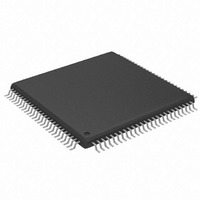PIC24FJ256GA110-I/PT Microchip Technology, PIC24FJ256GA110-I/PT Datasheet - Page 231

PIC24FJ256GA110-I/PT
Manufacturer Part Number
PIC24FJ256GA110-I/PT
Description
IC PIC MCU FLASH 256K 100TQFP
Manufacturer
Microchip Technology
Series
PIC® 24Fr
Datasheets
1.PIC24FJ128GA008-IPT.pdf
(12 pages)
2.PIC24FJ128GA106-IPT.pdf
(14 pages)
3.PIC24FJ128GA106-IPT.pdf
(330 pages)
4.PIC24FJ128GA106-IPT.pdf
(52 pages)
5.PIC24FJ256GA106-IPT.pdf
(59 pages)
6.PIC24FJ128GB110-IPF.pdf
(292 pages)
Specifications of PIC24FJ256GA110-I/PT
Program Memory Type
FLASH
Program Memory Size
256KB (85.5K x 24)
Package / Case
100-TFQFP
Core Processor
PIC
Core Size
16-Bit
Speed
32MHz
Connectivity
I²C, PMP, SPI, UART/USART
Peripherals
Brown-out Detect/Reset, LVD, POR, PWM, WDT
Number Of I /o
85
Ram Size
16K x 8
Voltage - Supply (vcc/vdd)
2 V ~ 3.6 V
Data Converters
A/D 16x10b
Oscillator Type
Internal
Operating Temperature
-40°C ~ 85°C
Processor Series
PIC24FJ
Core
PIC
Data Bus Width
16 bit
Data Ram Size
16 KB
Interface Type
I2C/SPI/UART
Maximum Clock Frequency
32 MHz
Number Of Programmable I/os
85
Number Of Timers
5
Maximum Operating Temperature
+ 85 C
Mounting Style
SMD/SMT
3rd Party Development Tools
52713-733, 52714-737, 53276-922, EWDSPIC
Development Tools By Supplier
PG164130, DV164035, DV244005, DV164005, PG164120, DM240001, DM240011
Minimum Operating Temperature
- 40 C
On-chip Adc
16-ch x 10-bit
Package
100TQFP
Device Core
PIC
Family Name
PIC24
Maximum Speed
32 MHz
Operating Supply Voltage
2.5|3.3 V
Lead Free Status / RoHS Status
Lead free / RoHS Compliant
For Use With
876-1004 - PIC24 BREAKOUT BOARDMA240015 - BOARD MCV PIM FOR 24F256GADM240011 - KIT STARTER MPLAB FOR PIC24F MCUAC164333 - MODULE SKT FOR PM3 100QFP
Eeprom Size
-
Lead Free Status / Rohs Status
Lead free / RoHS Compliant
Available stocks
Company
Part Number
Manufacturer
Quantity
Price
Company:
Part Number:
PIC24FJ256GA110-I/PT
Manufacturer:
MICROCHIP
Quantity:
1 925
Company:
Part Number:
PIC24FJ256GA110-I/PT
Manufacturer:
Microchip Technology
Quantity:
10 000
Part Number:
PIC24FJ256GA110-I/PT
Manufacturer:
MICR0CHIP
Quantity:
20 000
23.0
The Charge Time Measurement Unit is a flexible
analog module that provides accurate differential time
measurement between pulse sources, as well as
asynchronous pulse generation. Its key features
include:
• Four edge input trigger sources
• Polarity control for each edge source
• Control of edge sequence
• Control of response to edges
• Time measurement resolution of 1 nanosecond
• Accurate current source suitable for capacitive
Together with other on-chip analog modules, the CTMU
can be used to precisely measure time, measure
capacitance, measure relative changes in capacitance,
or generate output pulses that are independent of the
system clock. The CTMU module is ideal for interfacing
with capacitive-based sensors.
The CTMU is controlled through two registers,
CTMUCON and CTMUICON. CTMUCON enables the
module, and controls edge source selection, edge
source polarity selection, and edge sequencing. The
CTMUICON register has controls the selection and trim
of the current source.
FIGURE 23-1:
© 2008 Microchip Technology Inc.
Note:
measurement
CHARGE TIME
MEASUREMENT UNIT (CTMU)
This data sheet summarizes the features
of this group of PIC24F devices. It is not
intended to be a comprehensive reference
source. For more information, refer to the
associated “PIC24F Family Reference
Manual” chapter.
C
APP
TYPICAL CONNECTIONS AND INTERNAL CONFIGURATION FOR
CAPACITANCE MEASUREMENT
ANx
AN
R
PR
Y
PIC24FJ256GA110 FAMILY
EDG2
Preliminary
EDG1
PIC24FJ Device
A/D Converter
Timer1
CTMU
Current Source
Output Pulse
23.1
The CTMU module measures capacitance by generat-
ing an output pulse with a width equal to the time
between edge events on two separate input channels.
The pulse edge events to both input channels can be
selected from four sources: two internal peripheral
modules (OC1 and Timer1) and two external pins
(CTEDG1 and CTEDG2). This pulse is used with the
module’s precision current source to calculate
capacitance according to the relationship
For capacitance measurements, the A/D converter
samples an external capacitor (C
input channels after the CTMU output’s pulse. A preci-
sion resistor (R
on a second A/D channel. After the pulse ends, the
converter determines the voltage on the capacitor. The
actual calculation of capacitance is performed in
software by the application.
Figure 23-1 shows the external connections used for
capacitance measurements, and how the CTMU and
A/D modules are related in this application. This
example also shows the edge events coming from
Timer1, but other configurations using external edge
sources are possible. A detailed discussion on measur-
ing capacitance and time with the CTMU module is
provided in the “PIC24F Family Reference Manual”.
Measuring Capacitance
PR
) provides current source calibration
I = C •
dV
dT
APP
DS39905B-page 229
) on one of its












